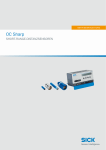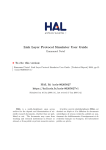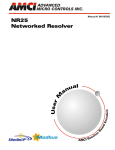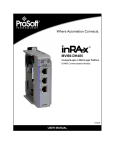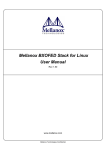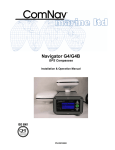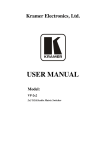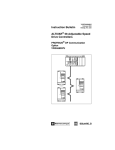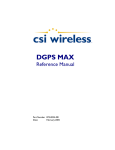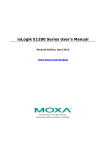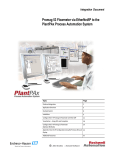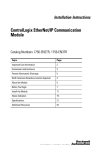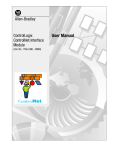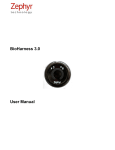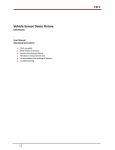Download 842E EtherNet/IP Absolute Encoder User Manual
Transcript
User Manual 842E EtherNet/IP™Absolute Encoder 842E-SIP-xxx, 842E-MIP-xxx Important User Information Because of the variety of uses for the products described in this publication, those responsible for the application and use of this control equipment must satisfy themselves that all necessary steps have been taken to assure that each application and use meets all performance and safety requirements, including any applicable laws, regulations, codes and standards. The illustrations, charts, sample programs and layout examples shown in the guide are intended solely for purposes of example. Since there are many variables and requirements associated with any particular installation, Rockwell Automation does not assume responsibility or liability (to include intellectual property liability) for actual use based upon the examples shown in this publication. Rockwell Automation publication SGI-1.1, Safety Guidelines for the Application, Installation and Maintenance of Solid-State Control (available from your local Rockwell Automation sales office), describes some important differences between solid-state equipment and electromechanical devices that should be taken into consideration when applying products such as those described in this publication. Reproduction of the contents of this copyrighted publication, in whole or part, without written permission of Rockwell Automation, is prohibited. Throughout this manual we use notes to make you aware of safety considerations: WARNING Identifies information about practices or circumstances that can cause an explosion in a hazardous environment, which may lead to personal injury or death, property damage, or economic loss. IMPORTANT Identifies information that is critical for successful application and understanding of ATTENTION Identifies information about practices or circumstances that can lead to personal injury or death, property damage, or economic loss. Attentions help you identify a hazard, avoid a hazard, and recognize the consequences. the product. SHOCK HAZARD Labels may be on or inside the equipment (for example, drive or motor) to alert people that dangerous voltage may be present. BURN HAZARD Labels may be on or inside the equipment (for example, drive or motor) to alert people that surfaces may reach dangerous temperatures. It is recommended that you save this user manual for future use. Table of Contents About this document Who should use this manual . . . . . . . . . . . . . . . . . . . . . . . . . . . . . . . . . . . . . . . iii Purpose of this manual . . . . . . . . . . . . . . . . . . . . . . . . . . . . . . . . . . . . . . . . . . . . iii Related documentation . . . . . . . . . . . . . . . . . . . . . . . . . . . . . . . . . . . . . . . . . . . . iii Common techniques used in this manual . . . . . . . . . . . . . . . . . . . . . . . . . . . iii Chapter 1 Safety Authorized personnel . . . . . . . . . . . . . . . . . . . . . . . . . . . . . . . . . . . . . . . . . . . . . .1 Correct use . . . . . . . . . . . . . . . . . . . . . . . . . . . . . . . . . . . . . . . . . . . . . . . . . . . . . . . .1 General safety notes and protective measures . . . . . . . . . . . . . . . . . . . . . . . . .2 Environmental protection . . . . . . . . . . . . . . . . . . . . . . . . . . . . . . . . . . . . . . . . . .2 Chapter 2 Encoder overview Overview of the encoder . . . . . . . . . . . . . . . . . . . . . . . . . . . . . . . . . . . . . . . . . . . .3 What is an encoder? . . . . . . . . . . . . . . . . . . . . . . . . . . . . . . . . . . . . . . . . . . . . 3 What are the different kinds of encoders?. . . . . . . . . . . . . . . . . . . . . . . . . 3 842E encoder features . . . . . . . . . . . . . . . . . . . . . . . . . . . . . . . . . . . . . . . . . . . . . .4 Configurable parameters. . . . . . . . . . . . . . . . . . . . . . . . . . . . . . . . . . . . . . . . . . . .5 The electronic data sheet file . . . . . . . . . . . . . . . . . . . . . . . . . . . . . . . . . . . . . . . .5 Chapter 3 EtherNet/IP overview Use of the Common Industrial Protocol . . . . . . . . . . . . . . . . . . . . . . . . . . . . .7 TCP/IP and UDP/IP . . . . . . . . . . . . . . . . . . . . . . . . . . . . . . . . . . . . . . . . . . 8 MAC address . . . . . . . . . . . . . . . . . . . . . . . . . . . . . . . . . . . . . . . . . . . . . . . . . . 8 Communication frame. . . . . . . . . . . . . . . . . . . . . . . . . . . . . . . . . . . . . . . . . . 8 Understanding the producer /consumer model . . . . . . . . . . . . . . . . . . . . . . .9 Specifying the requested packet interval . . . . . . . . . . . . . . . . . . . . . . . . . . . . .10 EtherNet/IP topologies. . . . . . . . . . . . . . . . . . . . . . . . . . . . . . . . . . . . . . . . . . . .10 Star topology. . . . . . . . . . . . . . . . . . . . . . . . . . . . . . . . . . . . . . . . . . . . . . . . . . 10 Linear topology . . . . . . . . . . . . . . . . . . . . . . . . . . . . . . . . . . . . . . . . . . . . . . . 11 Device level ring topology . . . . . . . . . . . . . . . . . . . . . . . . . . . . . . . . . . . . . . 17 CIP object model . . . . . . . . . . . . . . . . . . . . . . . . . . . . . . . . . . . . . . . . . . . . . . . . .17 Chapter 4 Installation Mechanical . . . . . . . . . . . . . . . . . . . . . . . . . . . . . . . . . . . . . . . . . . . . . . . . . . . . . . .23 Shaft rotation direction . . . . . . . . . . . . . . . . . . . . . . . . . . . . . . . . . . . . . . . . 23 Mounting with a solid shaft . . . . . . . . . . . . . . . . . . . . . . . . . . . . . . . . . . . . 23 Mounting with a hollow shaft . . . . . . . . . . . . . . . . . . . . . . . . . . . . . . . . . . 24 Mechanical specifications . . . . . . . . . . . . . . . . . . . . . . . . . . . . . . . . . . . . . . 24 Electrical . . . . . . . . . . . . . . . . . . . . . . . . . . . . . . . . . . . . . . . . . . . . . . . . . . . . . . . . .25 Electrical wiring instructions . . . . . . . . . . . . . . . . . . . . . . . . . . . . . . . . . . . 25 Pin assignments . . . . . . . . . . . . . . . . . . . . . . . . . . . . . . . . . . . . . . . . . . . . . . . 26 Preset push button . . . . . . . . . . . . . . . . . . . . . . . . . . . . . . . . . . . . . . . . . . . . 26 Network address switches . . . . . . . . . . . . . . . . . . . . . . . . . . . . . . . . . . . . . . 26 Electrical specifications . . . . . . . . . . . . . . . . . . . . . . . . . . . . . . . . . . . . . . . . 27 Rockwell Automation Publication 842E-UM001B-EN-P—April 2015 i Table of Contents Chapter 5 Configuring the encoder for your EtherNet/IP network Setting the IP Address . . . . . . . . . . . . . . . . . . . . . . . . . . . . . . . . . . . . . . . . . . . . 29 Assigning the last octet in an IP address scheme of 192.168.1.xxx using the network address switches . . . . . . . . . . . . . . . . . . . . . . . . . . . . . . . . . . .29 Assigning the IP Address using BootP/DHCP:. . . . . . . . . . . . . . . . . . .30 Chapter 6 Configuring the 842 E encoder using RSLogix 5000 Example: setting up the hardware . . . . . . . . . . . . . . . . . . . . . . . . . . . . . . . . . . 33 Configuring the encoder . . . . . . . . . . . . . . . . . . . . . . . . . . . . . . . . . . . . . . .34 Setting up the add-on profile in RSlogix 5000 . . . . . . . . . . . . . . . . . . . . . . . 35 General tab. . . . . . . . . . . . . . . . . . . . . . . . . . . . . . . . . . . . . . . . . . . . . . . . . . . .38 Ethernet address . . . . . . . . . . . . . . . . . . . . . . . . . . . . . . . . . . . . . . . . . . . . . . .39 Module definition . . . . . . . . . . . . . . . . . . . . . . . . . . . . . . . . . . . . . . . . . . . . .40 Connection tab. . . . . . . . . . . . . . . . . . . . . . . . . . . . . . . . . . . . . . . . . . . . . . . .41 Module Info tab . . . . . . . . . . . . . . . . . . . . . . . . . . . . . . . . . . . . . . . . . . . . . . .42 Configuration tab . . . . . . . . . . . . . . . . . . . . . . . . . . . . . . . . . . . . . . . . . . . . .43 Internet Protocol tab. . . . . . . . . . . . . . . . . . . . . . . . . . . . . . . . . . . . . . . . . . .44 Network tab. . . . . . . . . . . . . . . . . . . . . . . . . . . . . . . . . . . . . . . . . . . . . . . . . . .45 Configuration. . . . . . . . . . . . . . . . . . . . . . . . . . . . . . . . . . . . . . . . . . . . . . . . . . . . 46 Default encoder settings . . . . . . . . . . . . . . . . . . . . . . . . . . . . . . . . . . . . . . . .46 Preset function . . . . . . . . . . . . . . . . . . . . . . . . . . . . . . . . . . . . . . . . . . . . . . . .46 RSLogix 5000 controller tags . . . . . . . . . . . . . . . . . . . . . . . . . . . . . . . . . . . . . . 47 Chapter 7 Diagnostics and troubleshooting Status indicators. . . . . . . . . . . . . . . . . . . . . . . . . . . . . . . . . . . . . . . . . . . . . . . . . . 49 Self-test via EtherNet/IP . . . . . . . . . . . . . . . . . . . . . . . . . . . . . . . . . . . . . . . . . . 51 Warnings, alarms and errors via EtherNet/IP . . . . . . . . . . . . . . . . . . . . . . . 51 Warnings . . . . . . . . . . . . . . . . . . . . . . . . . . . . . . . . . . . . . . . . . . . . . . . . . . . . .52 Alarms. . . . . . . . . . . . . . . . . . . . . . . . . . . . . . . . . . . . . . . . . . . . . . . . . . . . . . . .52 Errors. . . . . . . . . . . . . . . . . . . . . . . . . . . . . . . . . . . . . . . . . . . . . . . . . . . . . . . . .53 Appendix A Installing the add-on profile Introduction . . . . . . . . . . . . . . . . . . . . . . . . . . . . . . . . . . . . . . . . . . . . . . . . . . . . . 55 Performing the installation . . . . . . . . . . . . . . . . . . . . . . . . . . . . . . . . . . . . . . . . 55 Appendix B RSLogix 5000 sample code ii Linear scaling example . . . . . . . . . . . . . . . . . . . . . . . . . . . . . . . . . . . . . . . . . . . . 59 Setting up your project. . . . . . . . . . . . . . . . . . . . . . . . . . . . . . . . . . . . . . . . . . . . 60 Using an explicit message configuration to set preset encoder value . . . 65 Using an explicit message configuration to read preset encoder value . . 69 Using an explicit message configuration to obtain the encoder’s run-time in seconds. . . . . . . . . . . . . . . . . . . . . . . . . . . . . . . . . . . . . . . . . . . . . . . 73 Rockwell Automation Publication 842E-UM001B-EN-P—April 2015 About this document Read this section to familiarize yourself with the rest of the manual. It provides information concerning: • Who should use this manual • The purpose of this manual • Related documentation • Conventions used in this manual Who should use this manual Use this manual if you are responsible for designing, installing, programming, or troubleshooting control systems that use 842E EtherNet/IP™ encoder. You should have a basic understanding of electrical circuitry and familiarity with relay logic. If you do not, obtain the proper training before using this product. Purpose of this manual This manual is a reference guide for the 842E EtherNet/IP encoders. It describes the procedures you use to install, wire, and troubleshoot your encoder. This manual: • Gives you an overview of the 842E EtherNet/IP encoders • Explains how to install and wire your encoder Related documentation The following documents contain additional information concerning Rockwell Automation products. To obtain a copy, contact your local Rockwell Automation office or Allen-Bradley® distributor. Common techniques used in this manual Resource Description Installation Instructions 842E EtherNet/IP Multi-turn Encoders Pub. # 10000169360 EtherNet/IP Modules in Logix5000 Control Systems User Manual, publication ENET-UM001 A manual on how to use EtherNet/IP modules with Logix5000 controllers and communicate with various devices on the ethernet network Getting Results with RSLogix™ 5000, publication 9399-RLD300GR Information on how to install and navigate RSLogix 5000. The guide includes troubleshooting information and tips on how to use RSLogix 5000 effectively. M116 On-Machine Connectivity Catalog, M116-CA001A An article on wire sizes and types for grounding electrical equipment Allen-Bradley Industrial Automation Glossary, AG-7.1 A glossary of industrial automation terms and abbreviations The following conventions are used throughout this manual: • Bulleted lists such as this one provide information, not procedural steps. • Numbered lists provide sequential steps or hierarchical information. • Italic type is used for emphasis. Rockwell Automation Publication 842E-UM001B-EN-P—April 2015 iii About this document Notes: iv Rockwell Automation Publication 842E-UM001B-EN-P—April 2015 Chapter 1 Safety This chapter deals with your own safety and the safety of the equipment operators. Please read this chapter carefully before working with the 842E EtherNet/IP encoder or the machine or system in which the 842E EtherNet/IP encoder is used. Authorized personnel ATTENTION The 842E EtherNet/IP encoder must only be installed, commissioned, and serviced by authorized personnel. Repairs to the 842E EtherNet/IP encoder are only allowed to be undertaken by trained and authorized service personnel from Rockwell Automation. The following qualifications are necessary for the various tasks: Correct use Activity Qualification Mounting Basic technical training Knowledge of the current safety regulations in the workplace Electrical installation and replacement Practical electrical training Knowledge of current electrical safety regulations Knowledge on the use and operation of devices in the related application (e.g., industrial robots, storage, and conveyor technology) Commissioning, operation, and configuration Knowledge on the current safety regulations and the use and operation of devices in the related application Knowledge of automation systems (e.g. Rockwell ControlLogix controller) Knowledge of EtherNet/IP Knowledge of the usage of automation software (e.g. Rockwell RSLogix) The 842E EtherNet/IP Absolute Encoder is an instrument that is manufactured in accordance with recognized industrial regulations and meets the quality requirements as per ISO 9001:2008 as well as those of an environment management system as per ISO 14_001:2009. Rockwell Automation Publication 842E-UM001B-EN-P—April 2015 1 Chapter 1 Safety An encoder is a device for mounting that cannot be used independently of its foreseen function. For this reason an encoder is not equipped with immediate safety devices. Considerations for the safety of personnel and systems must be provided by the operator of the system as per statutory regulations. Due to its design, the 842E EtherNet/IP can only be operated within an EtherNet/IP network. It is necessary to comply with the EtherNet/IP specifications and guidelines for setting up an EtherNet/IP network. In case of any other usage or modifications to the 842E EtherNet/IP, e.g., opening the housing during mounting and electrical installation, or in case of modifications to the software, any claims against Rockwell Automation under warranty will be rendered void. General safety notes and protective measures Environmental protection 2 ATTENTION Please observe the following procedures in order to ensure the correct and safe use of the 842E EtherNet/IP encoder. The encoder is to be installed and maintained by trained and qualified personnel with knowledge of electronics, precision mechanics and control system programming. It is necessary to comply with the related standards covering the technical safety stipulations. All safety regulations are to be met by all persons who are installing, operating or maintaining the device: • The operating instructions must always be available and must always be followed. • Unqualified personnel are not allowed to be present in the vicinity of the system during installation. • The system is to be installed in accordance with all applicable safety regulations and the mounting instructions. • All work safety regulations of the applicable countries are to be followed during installation. • Failure to follow all applicable health and safety regulations may result in personal injury or damage to the system. • The current and voltage sources in the encoder are designed in accordance with all applicable technical regulations. Please note the following information on disposal. Assembly Material Disposal Packaging Cardboard Waste paper Shaft Stainless steel Scrap metal Flange Aluminum Scrap metal Housing Aluminum Die-cast Scrap metal Electronic assemblies Various Hazardous waste Rockwell Automation Publication 842E-UM001B-EN-P—April 2015 Chapter 2 Encoder overview The 842E family of encoders uses EtherNet/IP technology to provide its data to a programmable controller. These encoders include an embedded EtherNet/IP switch to connect additional EtherNet/IP capable products in series and/or support a device level ring (DLR) topology for ethernet media redundancy. The 842E are ultra-high resolution encoders in single-turn and multi-turn versions. These encoders have 18 bit single-turn resolution. The multi-turn has an additional 12 bits for counting the number of revolutions. Overview of the encoder What is an encoder? Encoders can electronically monitor the position of a rotating shaft to measure information such as speed, distance, RPM, and position. Rockwell Automation offers a variety of light- and heavy-duty incremental and absolute encoders. Our accessories help you easily install and efficiently use our encoders. What are the different kinds of encoders? Incremental A simple and cost-effective solution for a wide variety of applications, incremental encoders electronically monitor the position or speed of a rotating shaft. Encoder feedback is compatible with programmable controllers, numerical controllers, motion controllers, and other positioning systems. Rockwell Automation offers light-duty and heavy-duty incremental encoders for differing shaft loads. Ruggedized incremental encoders are available with an enclosure rating of NEMA Type 4 and IP66. Incremental encoders are also available in solid and hollow shaft models for a variety of mounting options. Applications include: machine tools, packaging machinery, motion controls, robotics, and DC drives. Absolute An absolute encoder has a unique digital output for each shaft position. The use of absolute encoders assures that true position is always available, regardless of power interruptions to the system. Absolute encoders can be single-turn or multiturn. Rockwell Automation Publication 842E-UM001B-EN-P—April 2015 3 Chapter 2 Encoder overview Multi-turn units assign a unique digital output for each shaft position across multiple shaft rotations and are capable of extremely high resolutions. Rockwell Automation absolute encoders are available with an enclosure rating of NEMA Type 4 and IP66, as well as a variety of mounting options. Applications include steel mills, overhead cranes, punch presses, transfer lines, oil rigs, wind mills, machine tools, and packaging. Sine-cosine A sine-cosine encoder is a position transducer using two sensors, each 90° out of phase with respect to the other. Sine-cosine encoders can be used directly by the drive or squared to provide a conventional A quad B digital signal. Therefore, the sine-cosine encoder can be used as an absolute, sine-cosine, or incremental feedback device. Single-turn vs. multi-turn Absolute encoders are either single-turn or multi-turn. Single-turn encoders are used if the absolute position of the shaft for one revolution is required. Multiturn encoders are used if the absolute position is required for more than one shaft revolution. 842E encoder features The 842E EtherNet/IP encoder features include: • Support for the encoder profile 22h (0x22) defined in the Common Industrial Protocol (CIP ™), according to IEC 61784-1 • Compatibility with star, linear and device level ring topology • Robust nickel code disk for harsh ambient conditions • Configurable resolution per revolution: 1 to 262,144 • High precision and availability • Ball bearing spacing of 30 mm for longer life • Face mount flange and servo flange/blind hollow shaft and through hollow shaft • 18-bit single turn resolution • 30-bit total resolution multi-turn resolution • Endless shaft • Flash update IMPORTANT A Series A encoder can not be updated to a Series B. A Series B encoder must be purchased in order to update future firmware. Series A does not have flash update capability. 4 Rockwell Automation Publication 842E-UM001B-EN-P—April 2015 Encoder overview Chapter 2 Configurable parameters The EtherNet/IP technology allows for certain encoder parameters to be configured over the network. • Counting direction • Counts per revolution • Preset value • Velocity output • IP addressing The electronic data sheet file The electronic data sheet (EDS) file contains all the information related to the measuring-system-specific parameters as well as the operating modes of the 842E EtherNet/IP encoders. The EDS file is integrated using the EtherNet/IP network configuration tool to configure and place in operation the 842E EtherNet/IP encoder For more information, go to www.rockwellautomation.com/resources/eds/ and search on “842E.” Operating principle of the encoder Operating principle of the 842E EtherNet/IP encoder acquires the position of rotating axes and outputs the position in the form of a unique digital numeric value. Optical acquisition of the rotary position value is from an internal coded disk. The 842E-SIP-xxx EtherNet/IP is a singleturn encoder Singleturn encoders are used if the absolute position of the shaft for one revolution is required. The 842E-MIP-xxxEtherNet/IP is a multiturn encoder Multiturn encoders are used if the absolute position is required for more than one shaft revolution. Scalable resolution The steps per revolution and the total resolution can be scaled and adapted to the related application. The steps per revolution can be scaled in integers from 1…32,767 (Basic) or from 1…262,144 (Advanced). The total resolution of the 842E-MIP Multi-turn EtherNet/IP encoder must be 2H times the steps per revolution. This restriction is not relevant if the round axis or endless shaft functionality is activated. Rockwell Automation Publication 842E-UM001B-EN-P—April 2015 5 Chapter 2 Encoder overview 842E EtherNet/IP is firmware flash gradable using Control Flash. Special Features Encoder Properties Absolute Encoder in 60 mm design Robust nickel coded disk for harsh environment High precision and reliability Large ball bearing spacing of 30 mm High level of resistance to vibration Optimal rotational accuracy Compact design Face mount flange, servo flange and blind Hollow shaft Firmware flash upgradable 18-bit single-turn resolution (1 to 262,144 steps) Single-turn Multi-turn ■ ■ ■ ■ ■ ■ ■ ■ ■ ■ ■ ■ ■ ■ ■ ■ ■ ■ ■ ■ ■ ■ ■ ■ ■ ■ ■ ■ ■ ■ ■ 30-bit total resolution 12-bit multi-turn resolution (1…4,096 revolutions) Round axis functionality/endless shaft functionality EtherNet/IP interface (as per IEC 61784-1) Supports the encoder profile 22h defined in the CIP (common industrial protocol) Device level ring (DLR) 6 Rockwell Automation Publication 842E-UM001B-EN-P—April 2015 Chapter 3 EtherNet/IP overview Ethernet Industrial Protocol (EtherNet/IP) is a frame-based computer networking technology for local industrial area networks. It follows the seven layers of the Open Systems Interconnection model: OSI Model Layer Host Layers Media Layers Use of the Common Industrial Protocol Function 7. Application Network process to application 6. Presentation Data, encryption 5. Session Inter-host communication Explicit and implicit messaging 4. Transport Flow control, TCP/UDP 3. Network Internet protocol, logical addressing 2. Data Link Physical addressing 1. Physical Media, signal and binary transmission, peer-to-peer, multicast, unicast EtherNet/IP implements the Common Industrial Protocol (CIP), the application layer protocol specified for EtherNet/IP. EtherNet/IP uses the CIP on the process layer. Similarly, as, for example, FTP is used for the transfer of files, this protocol is used for process control. The 842E encoder meets the requirements of the EtherNet/IP protocol according to IEC 61784-1 and those of the encoder profile. FTP CIP HTTP UDP TCP Explicit messagin g Implicit messaging Process layer Communication layers IP Ethernet Rockwell Automation Publication 842E-UM001B-EN-P—April 2015 Physical layer 7 Chapter 3 EtherNet/IP overview The encoder is an I/O adapter in the EtherNet/IP. It receives and sends explicit and implicit messages either cyclic or on request (polled). TCP/IP and UDP/IP EtherNet/IP uses TCP/IP or UDP/IP for communication. (TCP is transmission control protocol and UDP is user datagram protocol.) Implicit messaging is used for real-time communication between a programmable logic controller (PLC) and the encoder in EtherNet/IP. With implicit messaging a connection is established between exactly two devices within the CIP to transfer, for example, I/O data such as position or velocity from the encoder to the PLC. Implicit messaging uses UDP/IP via port 2222. As a result, a fast data rate is used. Explicit messaging is used in EtherNet/IP for communication that does not need to take place in real time. Explicit messaging uses TCP/IP; it is used, for example, to transfer parameters from the PLC to the encoder. MAC address Devices that originate or use data on the network have factory-assigned media access control (MAC) addresses for unique identification. The MAC address (MAC ID) consists of 6 bytes. The first three bytes identify the manufacturer. The last three bytes are unique to the device. An example of a MAC address is 00:00:BC:C9: D7:14. Communication frame EtherNet/IP is based on the standard ethernet FRAME. This contains the ethernet header, the ethernet data and the ethernet trailer. The MAC addresses of the receiver (destination address) and of the source (source address) are contained in the ethernet header. Transmission sequence Data field Header Destination Address Source Address 46...1500 Byte 8 Rockwell Automation Publication 842E-UM001B-EN-P—April 2015 Trailer EtherNet/IP overview Chapter 3 The ethernet data field consists of several nested protocols: • The IP datagram is transported in the user data of the ethernet data field. • The TCP segment or the UDP datagram are transported in the user data of the IP datagram. • The CIP protocol is transported in the user data of the TCP segment or of the UDP datagram. IP header TCP/UDP header CIP header CIP data CIP protocol TCP segment or UDP datagram IP datagram CIP is a message-based protocol that implements a relative path to send a message from the “producing” device in a system to the “consuming” devices. The producing device contains the path information that steers the message along the proper route to reach its consumers. Because the producing device holds this information, other devices along the path simply pass this information; they do not need to store it. This has two significant benefits: • You do not need to configure routing tables in the bridging modules, which greatly simplifies maintenance and module replacement. • You maintain full control over the route taken by each message, which enables you to select alternative paths for the same end device. Understanding the producer/consumer model The CIP “producer/consumer” networking model replaces the old source/ destination (“master/slave”) model. The producer/consumer model reduces network traffic and increases speed of transmission. In traditional I/O systems, controllers poll input modules to obtain their input status. In the CIP system, input modules are not polled by a controller. Instead, they produce their data either upon a change of state or periodically. The frequency of update depends upon the options chosen during configuration and where on the network the input module resides. The input module, therefore, is a producer of input data and the controller is a consumer of the data. The controller can also produce data for other controllers to consume. The produced and consumed data is accessible by multiple controllers and other devices over the EtherNet/IP network. This data exchange conforms to the producer/consumer model. Rockwell Automation Publication 842E-UM001B-EN-P—April 2015 9 Chapter 3 EtherNet/IP overview Specifying the requested packet interval The requested packet interval (RPI) is the update rate specified for a particular piece of data on the network. This value specifies how often to produce the data for that device. For example, if you specify an RPI of 50 ms, it means that every 50 ms the device sends its data to the controller or the controller sends its data to the device. RPIs are only used for devices that exchange data. For example, a ControlLogix EtherNet/IP bridge module in the same chassis as the controller does not require an RPI because it is not a data-producing member of the system; it is used only as a bridge to remote modules. EtherNet/IP topologies The 842E encoders can be connected in any of three network topologies: star, linear or device level ring (DLR). IMPORTANT Rockwell Automation recommends that you use no more than 50 nodes on a single DLR or linear network. If your application requires more than 50 nodes, we recommend that you segment the nodes into separate, but linked, DLR or linear networks. Star topology The star structure consists of a number of devices connected to a central switch. IMPORTANT 10 When this topology is used, make the ethernet connection on the 842E encoder to the Link 1 connection. The Link 2 ethernet connection must remain unused. Rockwell Automation Publication 842E-UM001B-EN-P—April 2015 EtherNet/IP overview Chapter 3 Linear topology The linear topology uses the embedded switching capability to form a daisychain style network that has a beginning and an end. Linear topology simplifies installation and reduces wiring and installation costs, but a break in the network disconnects all devices downstream from the break. When this topology is used, both ethernet connections on the encoder may be used. For the network connection use Link 1, Link 2, or both. Endless Shaft Functionality The endless-shaft feature is not supported for the single-turn encoder. This functionality is applicable only for the multi-turn Ethernet encoders. The round axis functionality or endless shaft functionality removes the restriction that the total resolution must be 2H times the steps per revolution. The shaft is considered an endless shaft. The steps per revolution are not configured directly. Instead the nominator and divisor for the number of revolutions are defined. The total measuring range can be scaled from 1…1,073,741,824 as an integer. The encoder supports the function for round axes. During this process, the steps per revolution are set as a fraction. As a result, the total resolution does not have to be configured to 2H times the steps per revolution and can also be a decimal number. The output position value is adjusted with the zero point correction, the counting direction set and the gearbox parameters entered. Number of revolutions, nominator for the round axis functionality: The nominator can be scaled from 1…2,048 as an integer. The default factory setting for the nominator is 2,048. Number of revolutions, divisor for the round axis functionality: The divisor can be scaled from 1…65,535 as an integer. The default factory setting for the divisor is 1. Example: A rotary table for a filling system is to be controlled. The steps per revolution are predefined by the number of filling stations. There are nine filling stations. For Rockwell Automation Publication 842E-UM001B-EN-P—April 2015 11 Chapter 3 EtherNet/IP overview the precise measurement of the distance between two filling stations, 1000 steps are required. The number of revolutions is pre-defined by the transmission ratio = 12.5 of the rotary table gearing. The total resolution is then 9 × 1,000 = 9,000 steps, to be realized in 12.5 revolutions of the encoder. This ratio cannot be realized via the steps per revolution and the total resolution, as the total resolution is not 2H times the steps per revolution. The application problem can be solved using the round axis functionality. The steps per revolution are ignored here. The total resolution as well as the nominator and divisor for the number of revolutions are configured. 9,000 steps are configured as the total resolution. For the nominator for the number of revolutions 125 is configured, 10 as the divisor (125/10 = 12.5). After 12.5 revolutions (that is after one complete revolution of the rotary table) the encoder reaches the total resolution of 9,000. Test: In this example, we will be issuing incremental MAM motion commands to the K6500 CIP axis, & compare accuracy against 842E-M position tag. Verify the measuring range (unwind) position rolls-over correctly when approach from both CW and CCW directions. See the tables attached for specific test intervals based on the numerator, denominator, and measurement ranges selected. 12 Rockwell Automation Publication 842E-UM001B-EN-P—April 2015 EtherNet/IP overview Chapter 3 Measuring Range Test Bi-Directional Rollover Test Pass/Fail 1 One Rev Distance Check Test 2 One Rev Distance Accuracy (counts) Numerator Denominator Measuring Range (CMR) 1 1 0 n/a n/a n/a Message Instruction Errors – this is expected operation 1 1 1 Pass Pass 0 Position does not change. This is the expected operation. 1 1 2 Pass Pass 0 1 1 4 Pass Pass 0 1 1 8 Pass Pass 0 1 1 16 Pass Pass 0 1 1 1,024 Pass Pass 0 1 1 4,096 Pass Pass 0 1 1 16,535 Pass Pass 1 1 1 262,144 Pass Pass 1 1 1 2 1 1 1 262,150 524,288 524,288 Pass Pass Pass Pass Pass Pass NOTES 1 Position Rolls-over @ 262,144 This is expected behavior as the CMR limit is 262,144 based on the following formula CMR = (CNR_N / CNR_D) * CPR where CPR = 262,144 1 Position Rolls-over @ 262,144 This is expected behavior as the CMR limit is 262,144 based on the following formula CMR = (CNR_N / CNR_D) * CPR where CPR = 262,144 1 Position Rolls-over @ 524,288 This is expected behavior as the CMR limit is 262,144 based on the following formula CMR = (CNR_N / CNR_D) * CPR where CPR = 262,144 2 1 1,048,576 Pass Pass 1 Position Rolls-over at 524,288 This is expected behavior as the CMR limit is 524,288 based on the following formula CMR = (CNR_N / CNR_D) * CPR where CPR = 262,144 1 1 536,870,912 Pass Pass 1 Position Rolls-over @ 262,144 Rockwell Automation Publication 842E-UM001B-EN-P—April 2015 13 Chapter 3 EtherNet/IP overview Numerator Test Numerator (CNR_N) Denominator (CNR_D) Measuring Range (CMR) Bi-Directional Rollover Test Pass/Fail One Rev Distance Check Test Pass/Fail Distance Accuracy (counts) 0 1 262,144 n /a n/a n/a Message Instruction Errors – this is expected operation 2 1 262,144 Pass Pass 0-1 131,072 counts per turn of the encoder 4 1 262,144 Pass Pass 0-1 65,536 counts per turn of the encoder 8 1 262,144 Pass Pass 0-1 32,768 counts per turn of the encoder 16 1 262,144 Pass Pass 0-1 16,384 counts per turn of the encoder 32 1 262,144 Pass Pass 0-1 8,196 counts per turn of the encoder 64 1 262,144 Pass Pass 0-1 4.096 counts per turn of the encoder 128 1 262,144 Pass Pass 0-1 2,048 counts per turn of the encoder 256 1 262,144 Pass Pass 0-1 1,024 counts per turn of the encoder 512 1 262,144 Pass Pass 0-1 512 counts per turn of the encoder 1024 1 262,144 Pass Pass 0-1 256 count per turn of the encoder 2048 1 262,144 Pass Pass 0-1 128 count per turn of the encoder 2049 1 262,144 n/a n/a n/a Message Instruction Errors – this is expected operation 14 Rockwell Automation Publication 842E-UM001B-EN-P—April 2015 NOTES EtherNet/IP overview Chapter 3 Denominator Test Numerator Denominator Measuring Range (CMR) 1 0 262,144 Bi-Directional Rollover Test Pass/Fail One Rev Distance Check Test One Rev Distance Accuracy (counts) Pass Pass n/a Message Instruction Errors – this is expected operation NOTES 1 2 262,144 Pass Pass Pass I.Position doesn’t update and remains at zero. The is expected behavior as the CMR limit is 131072 based on the following formula CMR = (CNR_N / CNR_D) * CPR where CPR = 262,144 1 4 262,144 Pass Pass Pass Outside CMR Limit – See description above 1 8 262,144 Pass Pass Pass Outside CMR Limit – See description above 1 16 262,144 Pass Pass Pass Outside CMR Limit – See description above 1 32 262,144 Pass Pass Pass Outside CMR Limit – See description above 1 64 262,144 Pass Pass Pass Outside CMR Limit – See description above 1 128 262,144 Pass Pass Pass Outside CMR Limit – See description above 1 256 262,144 Pass Pass Pass Outside CMR Limit – See description above 1 512 262,144 Pass Pass Pass Outside CMR Limit – See description above 1 1024 262,144 Pass Pass Pass Outside CMR Limit – See description above 1 2048 262,144 Pass Pass Pass Outside CMR Limit – See description above 1 4096 262,144 Pass Pass Pass Outside CMR Limit – See description above 1 65535 262,144 Pass Pass Pass Outside CMR Limit – See description above 1 65536 262,144 Pass Pass Pass Message Instruction Errors – this is expected operation Rockwell Automation Publication 842E-UM001B-EN-P—April 2015 15 Chapter 3 EtherNet/IP overview Other Ratios Tested Bi-Directional Rollover Test Pass/Fail One Rev Distance Check Test Numerator Denominator Measuring Range (CMR) One Rev Distance Accuracy (counts) 2 2 4096 Pass Pass 2 4 4096 Pass Pass I.Position traverses 2 cyles / turn of the encoder with an unwind at 4096 2 8 4096 Pass Pass I.Position traverses 4 cycles / turn of the encoder with an unwind at 4096 2 32 4096 Pass Pass I.Position traverses 16 cycles / turn of the encoder with an unwind at 4096 16 32 4096 Pass Pass I.Position traverses 2 cyles / turn of the encoder with an unwind at 4096 16 32 131072 Pass Pass I.Position traverses 2 cyles / turn of the encoder with an unwind at 131072 NOTES 16 32 131073 Pass Pass I.Position doesn’t update and remains at zero. The is expected behavior as the CMR limit is 131072 based on the following formula CMR = (CNR_N / CNR_D) * CPR where CPR = 262,144 8 32 65536 Pass Pass I.Position traverses 4 cyles / turn of the encoder with an unwind at 65536 Pass I.Position doesn’t update and remains at zero. The is expected behavior as the CMR limit is 65536 based on the following formula CMR = (CNR_N / CNR_D) * CPR where CPR = 262,144 8 32 65537 Pass Features: Attribute 14 (e hex) Scaling Function Control (SFC) Attribute 125 (7d hex) Endless Shaft Functionality (ESF) Attribute 126 (7e hex Nominator (CNR_N) Attribute 127 (7f hex)– Divisor (CNR_D) Attribute 17 (11 hex) Total Measuring Range (CMR) IMPORTANT 16 Making online scaling changes, through the modules profile, is not allowed unless the encoder device is inhibited. Executing online changes will display an error message “Failed to modify properties. Failed to send configuration data to the module.” Consequently changes will be ignored. Online changes should be noted as “not allowed” in our documentation. Rockwell Automation Publication 842E-UM001B-EN-P—April 2015 EtherNet/IP overview Chapter 3 Device level ring topology A DLR network is a single-fault-tolerant ring network intended for the interconnection of automation devices. DLR topology is advantageous as it can tolerate a a break in the network. If a break is detected, the signals are sent out in both directions. With this topology, use both the Link 1 and Link 2 ethernet connections on the 842E encoder. CIP object model EtherNet/IP uses an object model for network communication wherein all functions and data of a device are defined. The important terms are as follows: Class: A class contains related objects of a device, organized in instances. Instance: An instance consists of different attributes that describe the properties of the instance. Different instances of a class have the same services, the same behavior, and the same attributes. They can, however, have different values. Attribute: The attributes represent the data a device provides over EtherNet/IP. These include the current values of, for example, a configuration or an input. Typical attributes are configuration and status information. Service: Services are used to access classes or the attributes of a class or to generate specific events. These services execute defined actions such as reading the attributes. The following table shows an example of the object model for the 842E encoders. Class 842E Instance Basic Advanced Attribute Value Resolution per revolution 15 bit Revolutions, total 12 bit Resolution per revolution 18 bit Revolutions, total 12 bit Rockwell Automation Publication 842E-UM001B-EN-P—April 2015 17 Chapter 3 EtherNet/IP overview The 842E EtherNet/IP encoder supports the following classes of the encoder profile: Supported classes Class code 0x01 Object class Description Identity object Contains information on the node within the network 1 Message router object Processes all messages and routes them to the appropriate objects 1 Assembly object (I/O-assembly class) Assembles attributes (data) of various objects to a single object Used for I/O messages 7 Connection manager object Contains connection specific attributes for triggering, transport, and connection type 1 Position sensor object Administrates device specific data like position and counting direction 1 Device level ring (DLR) object Contains the configuration and status information of the DLR protocol 1 QoS object Contains mechanisms used to treat traffic streams with different relative priorities 1 Port object Contains implemented port types port numbers and port names 1 TCP/IP interface object Contains all attributes for configuring the TCP/IP interface 1 Ethernet link object Contains connection-specific attributes like transmission rate, MAC address, or duplex mode 3 0x02 0x04 Number of instances 0x06 0x23 0x47 0x48 0xF4 0xF5 0xF6 23h Position sensor 01h Identity 02h Message router 04h Assembly F4h F5h F6h Network 06h Connection manager The Class Instance Attributes for the position sensor object are provided in the tables below. See Appendix B on page 59 for an example of how to create an explicit message in RSLogix 5000 using the position sensor object tables. 18 Rockwell Automation Publication 842E-UM001B-EN-P—April 2015 EtherNet/IP overview Class services of the position sensor object Instance Service Name Chapter 3 Description 0x05 Reset Reboot with all EEProm parameters of the encoder, reboot with the factory defaults 00: reboot Object– read all EEProm parameters 01: set and save factory defaults and reboot object– read all EEProm parameter 0x0E Get_Attribute_Single Returns value of attribute 0x15 (21dec) Restore Restore all parameter values from the non-volatile storage, customer defaults 0x16 (22dec) Save Save parameters to the non-volatile storage Class attributes of the position sensor object Nu m (dec Required/ Access ) optional rule Name Data type Description Default 1 Required (implemented ) Get Revision INT Object revision no 0x00 02 2 Implemented Get Max instance INT Max. instance number of an object in this class 0x00 01 3 Implemented Get Number of instances INT Number of object instances in this class 0x00 01 6 Implemented Get Maximum ID number class attributes INT Highest implemented class ID 0x00 64 7 Implemented Get Maximum ID number instance attributes INT Highest implemented instance attribute ID 0x00 7A 100 Get NV (1) Encoder firmware version ARRAY of bytes aa.bb: major revision minor revision dd.mm.yy: day.month.year 842eaa.bb dd.mm.yy (1) Nonvolatile Instance Services of the position sensor object are automatically populated in the explicit message instruction configuration Instance services of the position sensor object Instance Service name Description 0x0E Get_Attribute_Single Returns value of attribute 0x10 Set_Attribute_Single Sets value of attribute Rockwell Automation Publication 842E-UM001B-EN-P—April 2015 19 Chapter 3 EtherNet/IP overview 1Instance attributes of the position sensor object Attribute ID (dec) Access rule (1) Attribute ID (hex) NV / V (2) Name Data type Min. / max (default) Description 1 1 Get V Number of attributes INT Number of supported attributes in this class 0x0039 2 2 Get V Attribute list ARRAY of byte List of supported attributes – 10 A Get V Position value signed DINT Current position value (32 Bit) none 11 B Get NV INT Position sensor type (see following table, encoder ID) Device Type 0x01: Single-turn absolute encoder 0x02: Multi-turn absolute encoder Min 0x00 01 Max 0x00 02 (0x00 02) 12 C Set NV Direction counting toggle, code sequence (CS) BOOL Definition of direction of incrementing counts (10) 0: CW 1:CCW (0: CW) 13 D Set NV Commissioning diagnostic control (encoder position test) BOOL ON: 1 Encoder diagnostics possible OFF: 0 No diagnostics implemented (OFF: 0) 14 E Set NV Scaling function control (SFC) BOOL ON: 1 calc. value (from 16+42) OFF: 0 phys. resolution [steps] (OFF: 0) 15 F Set NV Position format ENG UNIT Format of position value (e.g., arcsec or steps) Engineering unit: 0x1001 (counts) (0x1001) 16 10 Set NV Counts per range DINT Number of requested steps per revolution. Min 0x00 00 00 01 Max 0x00 04 00 00 (0x00 04 00 00) 17 11 Set NV Total measuring range DINT Total resolution Min / Max 0x00 00 00 01 / Max. 2^n * Attr.16 (Max. 2^n * Attr.16) 18 12 Set NV Position measuring increment DINT Minimum resolution in steps (is always 0x00 01) (0x00 00 00 01) 19 13 Set NV Preset value DINT The preset value is set to the current position value Min / Max 0x00 00 00 00 / Attr.17 - 1 (0x00 00 00 00) 21 15 Get V Position status register BYTE State of the software limit switch Bit 0: Out of range Bit 1: Range overflow Bit: 2: Range underflow Bit 3…7 reserved (0x00) 22 16 Set NV Position low limit DINT Lower limit for position 0x00 00 00 00 23 17 Set NV Position high limit DINT Upper limit for position 0x3F FF FF FF 24 18 Get V Velocity value DINT Current velocity (32 Bit) Format (25) und (26) 25 19 Set NV Velocity format ENG INT Format of velocity value 0x1F04 counts/s 0x1F0E revs/s 0x1F0F revs/min (0x1F0F) 26 1A Set NV Velocity resolution DINT Minimum resolution of velocity value (24) (0x00 00 00 01) 27 1B Set NV Minimum velocity setpoint DINT Minimum velocity set-point for setting warning flag (47) (0x00 00 00 00) 28 1C Set NV Maximum velocity setpoint DINT Maximum velocity set-point for setting warning flag (47) (0x3F FF FF FF) 20 Rockwell Automation Publication 842E-UM001B-EN-P—April 2015 EtherNet/IP overview Attribute ID (dec) Access rule (1) Attribute ID (hex) NV / V (2) Name Data type Chapter 3 Min. / max (default) Description 29 1D Get V Acceleration value DINT Current acceleration (32 Bit) Format (30) und (31) 30 1E Set NV Acceleration format ENG UNIT Format of acceleration value 0x0810: cps/s 0x0811: rpm/s 0x0812: rps/s (0x0810) 31 1F Set NV Acceleration resolution DINT Minimum resolution of acceleration value (0x00 00 00 01) 32 20 Set NV Minimum acceleration setpoint DINT Minimum acceleration set-point (0x00 00 00 00) 33 21 Set NV Maximum acceleration setpoint DINT Maximum acceleration set-point 0x3F FF FF FF 41 29 Get V Operating status BYTE Operating status encoder Bit 0: Direct. 0 (inc.) 1 (dec.) Bit 1: Scaling 0 (off) 1 (on) Bit: 2…4 Reserved Bit: 5: Diag. 0 (off) 1 (on) Bit 6…7 manuf. spec. 42 2A Get NV Physical resolution span (PRS) DINT Number of steps per rev Basic = 15 bit Advanced = 18 bit (single-turn part) (0x00 04 00 00) 43 2B Get NV Physical resolution number of spans INT Number of revolutions (multi-turn part) (0x00 01) single (0x10 00) multi 44 2C Get V Alarms WORD Flags for alarms (errors) 45 2D Get NV Supported alarms WORD Information on supported alarms 0x3003 46 2E Get V Alarm flag BOOL Indication of set alarm 0: OK 1: Alarm error 47 2F Get V Warnings WORD Flags for warnings 48 30 Get NV Supported warnings WORD Information on supported warnings 0x673C 49 31 Get V Warning flag BOOL Indication of set warning 0: OK 1: Warning Flag 50 32 Get NV Operating time DINT Storage of operating time counter [0,1h], the format of the counter is second. 0 51 33 Get NV Offset value DINT Offset value is calculated when using preset function 0x00 00 00 00 100 64 Get V Temperature value INT Current temperature value -40…100°C or -40…212°F Accuracy of the temperature sensor is about +/- 5 °C. 0xF0 60 0x27 10 (-4000… +10000) 101 65 Set NV Temperature value format ENG UNIT Format of temperature value °C or °F (Fahrenheit) 0x1200: °C 0x1201: °F (0x1200) 102 66 Set NV Temperature resolution DINT Minimum resolution of temperature value [°C/100] or [(°F)/100] (0x00000001) 103 67 Set NV Minimum temperature value setpoint INT Minimum temperature set-point (-40…100°C, -40…212°F) 0xF0 60 (-4000) Rockwell Automation Publication 842E-UM001B-EN-P—April 2015 21 Chapter 3 Attribute ID (dec) EtherNet/IP overview Access rule (1) Attribute ID (hex) NV / V (2) Name Data type Min. / max (default) Description 104 68 Set NV Maximum temperature value setpoint INT Maximum temperature set-point (-40…100°C, -40…212°F) 0x27 10 (+10000) or 0x52D0 (+21200) 105 69 Get V Fault header (see Sensor error table) DINT Flags of encoder sensor errors and warnings 0x00 00 00 00 106 6A Set NV Slave sign of live DINT Flags for encoder functionalities (Bit-field): Bit 0: Slave sign of live (on/off) Bit 1…7: not used Bit 8…15: UpdateFactor (1…127) Bit 16…31: not used 0x0000500 107 6B Get NV Encoder motion time DINT Storage of the motion time. This counter is incrementing if the encoder is in rotation [sec]. 0 108 6C Get NV Encoder operating time [second] DINT Storage of the operating time. This counter is incrementing if the encoder is powered on [sec]. 0 109 6D Get NV Max velocity RA [cnts/ms] DINT Storage of the maximum velocity of the encoder in operational state. 0 110 6E Get NV Max acceleration [cnts/(ms)2] DINT Storage of the maximum acceleration of the encoder in operational state. 0 111 6F Get NV Max temp [°C/100] DINT Storage of the maximum temperature of the encoder in operational state 2000 112 70 Get NV Min temp [°C/100] DINT Storage of the minimum temperature of the encoder in operational state 2000 113 71 Get NV Number of startups DINT Storage of the number of startups (power-on) cycles 0 114 72 Get V LED current value [μA] INT Current LED current [μA] Range: 200…25.000 200…25.000 (0) 115 73 Get NV Max current value [μA] INT Max. LED current [μA] 1.500 116 74 Get NV Min current value [μA] INT Min. LED current [μA] 1.500 117 75 Get V Power supply voltage [mV] Accuracy is about 1% from the measurement value. INT Current supply voltage [mV] Range: 9.500…30.500 9.500…30.500 (24.000) (1) You can do a Get of all the Set values, as shown in Appendix B, page 59. It is always good programming practice to do a Get after setting a value to ensure the Set command was successful. (2) Nonvolatile/volatile 22 Rockwell Automation Publication 842E-UM001B-EN-P—April 2015 Chapter 4 Installation Mechanical This chapter describes how to install the 842E EtherNet/IP Encoder. Also refer to the installation sheet provided in the box, Publication No. 100000169360. Shaft rotation direction When you view the encoder from the shaft side, the shaft rotation is clockwise (CW) or counterclockwise (CCW), as shown. Mounting with a solid shaft 1. Be sure to select the proper size flexible coupling clamp to mate to the encoder shaft, e.g., 845–FC–*–*. See encoder accessories in the Sensors catalog. ATTENTION Do not rigidly connect the encoder shaft to the machine; this will cause premature failure of the encoder or machine bearings. Always use a flexible coupling. 2. Use the dimension drawings in the installation instructions to determine the encoder mounting hole locations (see “Related documentation” on page iii). 3. Slide the flexible coupling onto the shaft, but do not tighten the set screws. 4. Mount the encoder and tighten with three size M4 mounting screws (not supplied). 5. Center the flexible coupling and tighten the set screws. Rockwell Automation Publication 842E-UM001B-EN-P—April 2015 23 Chapter 4 Installation 6. Rotate the machine slowly and verify that the flexible coupling is not deforming beyond specifications. 7. Align machine to its mechanical zero or home position. 8. Remove the screw cover on the back of the encoder and press the preset push button to change the preset value to the current shaft position value. (The factory preset value is zero.) 9. Replace the screw cover. Mounting with a hollow shaft IMPORTANT Be sure the mating shaft is chamfered and grease-free. 1. Loosen the screw on the clamping ring with a 2.5-mm star driver. 2. Slide the encoder onto the mating shaft until the flex mount rests on the machine surface. ATTENTION The encoder should slide freely onto the shaft; if not, do not force. Check the shaft for interferences such as gouges, burrs, rust, or size. 3. Hold encoder firmly and mark the two mounting holes. (If mounting holes already exist, proceed to Step 6.) 4. Slide the encoder off. Drill and tap the marked holes to accept M4 (or equivalent) screws. 5. Slide the encoder back onto the shaft until the flex mount rests on the machine surface. 6. Attach the encoder with two M4 (or equivalent) screws. IMPORTANT Do not stress the flex mount while tightening the screws. 7. Tighten the clamping ring screw to 1.1 Nm (10 in–lb). 8. Align machine to its mechanical zero or home position. 9. Remove the screw cover on the back of the encoder and press the preset push button to change the preset value to the current shaft position value. (The factory preset value is zero.) 10. Replace the screw cover. Mechanical specifications 24 Rockwell Automation Publication 842E-UM001B-EN-P—April 2015 Installation Face mount flange 10 x 19 mm Servo flange 6 x 10 mm Blind hollow shaft 8, 19, 12, 15 mm and 1/4, 1/2, 3/8, 5/8 in. Chapter 4 Electrical ATTENTION Switch off the power supply. The machine/system could unintentionally start while you are connecting the devices. Ensure that the entire machine/system is disconnected during the electrical installation. ATTENTION Commissioning requires a thorough check by authorized personnel! Before you operate a system equipped with the 842E EtherNet/IP absolute encoder, make sure that the system is first checked and released by authorized personnel. Please read more in Chapter 1, Safety. Electrical wiring instructions Three electrical connections are located on the back of the housing. A 4-pin M12 connector is used for the power supply connection. Two 4-pin M12 connectors are used for the ethernet connection. The Link 1 connection is used for star networks. For ring networks, use both the Link 1 and Link 2 connectors. In a linear network, use Link 1, Link 2, or both connectors. Power connection Encoder Net Mod Link 2 connection Link 2 Link 1 Link 1 connection x10 Network address switches Network Address Switches x100 Rockwell Automation Publication 842E-UM001B-EN-P—April 2015 Reset Button x1 Preset push button 25 Chapter 4 Installation Pin assignments Voltage supply Pin Signal Mating cable wire color Function 1 Vs Brown Supply voltage 10…30V DC White Do not use Blue 0V DC (ground) Black Do not use 2 3 GND 4 Ethernet Link Connections – Link 1 and Link 2 Pin Signal Mating Cable Wire Color Function 1 TxD+ White orange Ethernet 2 RxD+ White green Ethernet 3 TxD– Orange Ethernet 4 RxD– Green Ethernet Preset push button ATTENTION Pressing the preset push button results in a change of position reading. This can cause unexpected motion which could result in personal injury or damage to the product or equipment. IMPORTANT Press the preset button briefly, no longer than one second. To preset the position of the encoder, remove the screw cover from the back of the encoder and briefly press the Preset button inside (see figure on page 25 and “Preset function” on page 46). Network address switches You can use the three Network Address switches to set the IP address of the encoder (see figure on page 31 and “Setting the IP Address” on page 29). 26 Rockwell Automation Publication 842E-UM001B-EN-P—April 2015 Installation Chapter 4 Electrical specifications Operating voltage 10…30V DC Power consumption 3W Load current 200 mA Resolution per revolution 262,144 Revolutions 4,096 Repeat accuracy ±0.002° Error limit ±0.03° Code direction CW or CCW programmable Interface EtherNet/IP per IEC 61784-1 Transmission speed 100 MBits/s Duplex Full or half Rockwell Automation Publication 842E-UM001B-EN-P—April 2015 27 Chapter 4 Installation Notes: 28 Rockwell Automation Publication 842E-UM001B-EN-P—April 2015 Chapter 5 Configuring the encoder for your EtherNet/IP network Setting the IP Address The 842E encoder is shipped with the network address switches set to 888. You must assign it an IP address using one of the two methods outlined below. You can set the IP address of the 842E encoder using either one of the following methods: 1. Use the network address switches (see figure on page 25) on the encoder to set the last octet of the IP address (192.168.1.xxx). 2. Use the network address switches to enable BootP / DHCP and use a BootP utility or DHCP server to assign the IP address of the unit on powerup. Assigning the last octet in an IP address scheme of 192.168.1.xxx using the network address switches 1. Set the three network address switches to 999. 2. Cycle power to the encoder. 3. Set the three network address switches to a valid address of 001 – 254. 4. Cycle power to the encoder. 5. The encoder will power up with the IP address set to 192.168.1.xxx, where xxx is the position of the three network address switches. Network address switches set to 123 x10 x100 Rockwell Automation Publication 842E-UM001B-EN-P—April 2015 x1 29 Chapter 5 Configuring the encoder for your EtherNet/IP network Assigning the IP Address using BootP/DHCP: Verify that the encoder’s MAC ID is in the relationship list in the BootP Utility or DHCP server before attempting to assign the encoder an IP address using this procedure. 1. Set the three network address switches to 999 and cycle power. 2. Set the three network address switches to 000 and cycle power. 3. The encoder will power up and request an IP address from a BootP/ DHCP server. 4. If the encoder’s MAC ID is in the relationship list, the BootP/DHCP server will assign the associated IP address to the corresponding MAC ID. Function of network address switch settings Setting of network address switches Function 001-254 Sets last octet of the IP address to the value indicated (xxx in 192.168.1.xxx) 888 Restores all factory default settings in the encoder and clearing its IP address 999 Clears the encoder’s IP address ATTENTION 30 Disable DHCP after the new network address is set (see next step). This prevents unexpected resetting of the network address, which could result in unintended machine motion or loss of process control. Rockwell Automation Publication 842E-UM001B-EN-P—April 2015 Configuring the encoder for your EtherNet/IP network Chapter 5 5. Disable DHCP: click once on the encoder in the relation list to highlight it. Then click Disable BOOTP/DHCP. This instructs the 842E encoder to retain the IP address at the next power cycle. Wait for the status message to show that the command was successfully sent. If the message does not appear, repeat this step. 6. Click File > Save As to save the relationship, if desired. 7. Cycle the power to the 842E encoder. You should no longer see the 842E encoder appear in the request history panel. From a DOS prompt, you can ping the new address. The response should be 4 packets sent, 4 packets received, and 0 lost. Rockwell Automation Publication 842E-UM001B-EN-P—April 2015 31 Chapter 5 Configuring the encoder for your EtherNet/IP network Notes: 32 Rockwell Automation Publication 842E-UM001B-EN-P—April 2015 Chapter 6 Configuring the 842 E encoder using RSLogix 5000 This chapter guides you through the steps required to configure your encoder using RSLogix 5000 software. Note that the modules presented in this chapter are configured using RSLogix 5000 software, version 20. Example: setting up the hardware In this example, a CompactLogix™ chassis contains the L35E processor in slot 1 and a built-in EtherNet/IP connection. The encoder is connected to a Stratix 6000 ethernet switch. To work along with this example set up your system as shown. • Verify the IP addresses for your programming terminal and 842E encoder. • Verify that you connected all wiring and cabling properly. • Be sure you configured your communication driver (for example, AB_ETH-1 or AB-ETHIP-1) in the RSLinx® software. Rockwell Automation Publication 842E-UM001B-EN-P—April 2015 33 Chapter 6 Configuring the 842 E encoder using RSLogix 5000 Configuring the encoder You must configure your encoder upon installation. The encoder will not work until it has been configured with at least the default configuration. RSLogix 5000 configuration software You must use RSLogix 5000, version 18 or later to set configuration for your encoder. The instructions in this chapter use version 20. You have the option of accepting default configuration for your encoder or writing point level configuration specific to your application. Both options are explained in detail, including views of software screens, in this chapter. Checking the integration in EtherNet/IP via RSLinx Classic With the aid of the tool RSLinx Classic you can again check whether the IP address set is detected by the control system. The EDS file (electronic data sheet) contains all the information related to the parameters as well as the operating modes of the EtherNet/IP encoder (go to www.rockwellautomation.com/resources/eds/ and search on “842E,” also see “The electronic data sheet file” on page 5). You can register the EDS file using the EDS hardware installation tool in the tools menu of RSLinx Classic software. 1. Start RSLinx Classic (as a rule on the Start menu on your PC/notebook in Rockwell Software, RSLinx, RSLinx Classic). 2. Click on the RSWho button in the program. 34 Rockwell Automation Publication 842E-UM001B-EN-P—April 2015 Configuring the 842 E encoder using RSLogix 5000 Chapter 6 3. Then open the path AB_ETHIP1, ethernet. The encoder can be seen with its IP address. 4. Install the add-on profile according to the instructions in Appendix A, page 55. IMPORTANT Setting up the add-on profile in RSlogix 5000 Before proceeding, install the add-on profile (see Appendix A, page 55). After you install the encoder add-on profile (see Appendix A, page 55), set up the add-on profile; here is an example of the setup procedure. 1. Open RSLogix 5000. 2. Click File>New. Rockwell Automation Publication 842E-UM001B-EN-P—April 2015 35 Chapter 6 Configuring the 842 E encoder using RSLogix 5000 3. Enter the new controller information. 4. Right-click on the ethernet port of the controller and select New Module. 36 Rockwell Automation Publication 842E-UM001B-EN-P—April 2015 Configuring the 842 E encoder using RSLogix 5000 Chapter 6 5. Select the desired 842E encoder and click Create. 6. Close the select module type dialog box. 7. Continue to the next sections to complete the add-on profile. Rockwell Automation Publication 842E-UM001B-EN-P—April 2015 37 Chapter 6 Configuring the 842 E encoder using RSLogix 5000 General tab 1. Enter a name for the encoder. In this example, the name is Encoder_1. You may have multiple encoders or other modules, so be sure to give each a brief but descriptive name. The name that you assign to the encoder appears in the controller organizer IO tree. The name will also appear in the description of tags. 2. Enter a description of the encoder’s function. 3. Set the ethernet address for the encoder. In this example, the address is 192.168.1.123. The 123 reflects the address of the network address switches on the 842E. 38 Rockwell Automation Publication 842E-UM001B-EN-P—April 2015 Configuring the 842 E encoder using RSLogix 5000 Chapter 6 Ethernet address When the controller is offline, the ethernet address can be set. You have three options: • When a private network is used, click on the Private Network radio button. Enter a value of 1…254 for the last segment (octet) of the address. Be sure not to duplicate the address of an existing device. In the preceding example, the address of the EtherNet/IP encoder is 192.168.1.123. • When multiple networks exist, you may choose to set the address to some other value. when offline, simply click the IP address radio button and enter the desired address • Click the Host Name radio button and type in the name of the host. In the example below, the host name is QPACK4. Rockwell Automation Publication 842E-UM001B-EN-P—April 2015 39 Chapter 6 Configuring the 842 E encoder using RSLogix 5000 Module definition The user should not have to make changes to the default values. If necessary, follow the steps below to change series, revision, electronic keying, connection, and/or input data. 1. On the General tab, click the Change button. The module definition window opens. 2. Click the arrows at the right of each box to access drop-down menus. • The connection drop-down menu allows you to select either a Data or Listen Only connection (see definitions, below). • The Input data drop-down menu allows you to select position, positionstatus, or position-velocity (see “RSLogix 5000 controller tags” on page 47 for more information). 3. Click OK to accept the changes (or Cancel to retain the original settings). See the definitions below. Click Help for more information. Data: This type of connection is used to read data from the encoder without controlling the outputs. This connection is not dependent on any other connection. Listen Only: This type of connection is dependent on another connection to exist. If that connection is closed, the listen-only connection will be closed as well. 40 Rockwell Automation Publication 842E-UM001B-EN-P—April 2015 Configuring the 842 E encoder using RSLogix 5000 Chapter 6 Connection tab You should not have to change any settings on the Connection tab. For reference, these are the settings: Requested Packet Interval: Specify the number of milliseconds between requests for information from the controller to the encoder. The encoder may provide data on a shorter interval, but if no data is received the controller asks the encoder for a status update. Minimum setting is 2 ms and the maximum setting is 750 ms. Inhibit Module: When checked, the encoder is not polled for information, and any information provided will be ignored by the controller. Major fault on controller if connection fails while in run mode: Check this box if a connection failure should be considered a major fault. Use Unicast Connection over EtherNet/IP: Unicast connections are point to point connections. Multicast connections are considered one to many. Unicast reduces the amount of network bandwidth used. Module fault: Fault messages will appear in this box. Rockwell Automation Publication 842E-UM001B-EN-P—April 2015 41 Chapter 6 Configuring the 842 E encoder using RSLogix 5000 Module Info tab The Module Info tab contains read-only data that is populated when the controller goes on line (a program is downloaded or uploaded from the controller). The left panel, Identification, shows the vendor, product type, product code, revision level, serial number, and product name. The right panel, Status, shows the fault status, internal state (i.e. run mode) and whether the file is owned and Module Identity. The Refresh and Reset Module buttons are active when the controller is on line. Refresh: Click this button to refresh the data in the window. Reset Module: Click this button with care as it disconnects the module momentarily and control will be interrupted. A warning window appears: “Click Yes or No as needed. Click Help for further information.” 42 Rockwell Automation Publication 842E-UM001B-EN-P—April 2015 Configuring the 842 E encoder using RSLogix 5000 Chapter 6 Configuration tab The Configuration tab is used to configure the encoder scaling, direction, and set velocity units. Click the Enable Scaling checkbox to change the encoder resolution. Use the Direction drop down box to set the direction of the encoder (check the definition in the old user manual). Use the velocity units to set the velocity units of the encoder. Scaling makes it possible to scale the steps per revolution and the total resolution (see “Linear scaling example” on page 59 in Appendix B). If the Enable Scaling box is checked, the values can be entered for the steps per revolution and the total resolution applied. Direction: The direction of rotation (increasing position value), viewed on the shaft, can be set to clockwise or counterclockwise. • Clockwise = increasing position value on clockwise revolution of the shaft • Counterclockwise = increasing position value on counterclockwise revolution of the shaft. Velocity units: Use this parameter to define the units in which the velocity is transmitted. The options are the following: • Counts/sec • Revolutions/sec • Revolutions/min Rockwell Automation Publication 842E-UM001B-EN-P—April 2015 43 Chapter 6 Configuring the 842 E encoder using RSLogix 5000 Internet Protocol tab For the purpose of this user manual, the user is expected to use a private address, that is, an address of 192.168.1.xxx. This window is automatically populated with the data. 44 Rockwell Automation Publication 842E-UM001B-EN-P—April 2015 Configuring the 842 E encoder using RSLogix 5000 Chapter 6 Network tab The Network tab contains read-only data that is populated when the controller goes online. Network Topology: This displays the current network topology as either linear/ star or ring. Network Status: This displays the current network status as normal, ring fault, or unexpected loop detected. The Refresh Communication link appears when communication with the encoder has failed. Click Refresh Communication to attempt to restart communication with the encoder. Rockwell Automation Publication 842E-UM001B-EN-P—April 2015 45 Chapter 6 Configuring the 842 E encoder using RSLogix 5000 Configuration Default encoder settings The 842E EtherNet/IP encoder is supplied with the following parameters: • Direction = clockwise • Scaling = none • Steps per revolution = 262,144 • Total resolution = 1,073,741,823 • Preset = 0 • Velocity measuring unit = rpm Preset function The 842E encoder position value is set to zero when the preset function is executed (by the preset push button or EtherNet/IP). This predefined value is stored in the EEPROM. The factory default preset value is zero. ATTENTION The preset function results in a change of position reading. This can cause unexpected motion which could result in personal injury and damage to the product or equipment. During preset, steps should be taken to ensure the shaft is stationary and will remain so. The preset function is not intended for use in dynamic parameter setting operations but as an electronic adjustment function during commissioning, in order to allocate a specific value to the mechanical rotary position of the 842E encoder. If the preset value is set by EtherNet/IP, the value must be within the total working range currently configured (steps per revolution and number of revolutions). The preset push button (see figure on page 25 and “Preset push button” on page 26) should only be operated when the encoder is powered and the green LED is blinking or steady. IMPORTANT 46 Press the preset button briefly, no longer than one second. Rockwell Automation Publication 842E-UM001B-EN-P—April 2015 Configuring the 842 E encoder using RSLogix 5000 RSLogix 5000 controller tags Chapter 6 During the encoder installation the encoder tags are automatically loaded as controller tags. This makes the tags available for all programs. In the controller organizer, click on the Controller Tags. The categories of tags appear. The tag name is composed of the encoder name followed by a: • :“C” for configuration • :“I” for input Configuration image table and tags Expand Enc_1:C by clicking “+.” This shows the configuration image table, which has the following tags: Enc_1:C.Counterclockwise: Configuration status of the direction of the count as defined in the encoder profile. Enc_1:C.VelocityUnits: Velocity units status of the encoder as defined in the encoder profile. Input image table and tags Expand Enc_1:I by clicking “+.” This shows the input image table, which has the following tags: Rockwell Automation Publication 842E-UM001B-EN-P—April 2015 47 Chapter 6 Configuring the 842 E encoder using RSLogix 5000 Enc_1:I.Fault: Fault status of the encoder. Enc_1:I.Position: Position status of the encoder. If position-status is selected from the input data selection in the encoder definition you will also see alarms and warning status. Enc_1:I.Velocity: Velocity status of the encoder is also included when selecting velocity-status from input data selection in the encoder definition. 48 Rockwell Automation Publication 842E-UM001B-EN-P—April 2015 Chapter 7 Diagnostics and troubleshooting This chapter describes the diagnostic process to correct and clear fault conditions on the 842E encoder. Cease operation if the cause of the malfunction has not been identified! ATTENTION Stop the machine if you cannot clearly identify the error and/or if you cannot safely rectify the malfunction. Status indicators The Mod LED shows the device status, the Net LED shows the status of the CIP connection, and the Encoder LED shows the status of the internal measuring device in the 842E EtherNet/IP encoder. Five LED indicators provide status information on the back of the encoder. The figure below shows their location and the tables below describe their status. Net Encoder Mod Link 2 Link 1 Screw cover Read the LEDs according to the following tables. LED Net Description OFF No power or No IP address Green flashing No connection The device has an IP address but no CIP connection. Green The device has an IP address and a CIP connection. Rockwell Automation Publication 842E-UM001B-EN-P—April 2015 49 Chapter 7 Diagnostics and troubleshooting LED Net Red flashing Warning, connection time-out Cleared by reset or a new connection Red Error IP address has been assigned to another device already. Green/Red flash Self-test at power-on LED Mod Description OFF No power Green Device operational Green flashing Standby/device not configured, no IP address assigned Red flashing Warning, but device still operational or Firmware update in progress Red Error, device not operational Green/red flashing Self-test at power-on LED Encoder 50 Description Description OFF No power or No IP address Green flashing Warning Wrong parameter Green Device operational Red flashing Warning, but device still operational or Firmware update in progress Red Error Encoder error Green / red flashing Self-test at power-on Rockwell Automation Publication 842E-UM001B-EN-P—April 2015 Diagnostics and troubleshooting Chapter 7 Ethernet Link LEDs Link 1 and 2 The ethernet link LEDs, Link 1 and Link 2, display the status of the physical connection on the ethernet interface. Link 1 or Link 2 LED Description OFF No link / power off Green solid Ethernet connection established Green flashing Data transmission TxD/RxD Amber solid Interface port locked Amber flashing Data collisions Electromagnetic interference (EMI) can cause incorrect operations or errors in the position value. Without a self-test an immediate position change may occur on power up. Self-test via EtherNet/IP Using the position sensor object a self-test can be triggered with attribute 13. See “CIP object model” on page 17. During this test the sensor and the most important functions are tested automatically. If an error occurs, bit 27 in the fault header is set. Warnings, alarms and errors via EtherNet/IP ATTENTION It is imperative to evaluate the alarms in your application! In case of a serious error, incorrect position values may be output. This change could cause an unexpected movement that may result in a hazard for persons or damage to the system or other objects. Within EtherNet/IP warnings, alarms, and errors can be retrieved using implicit messages and also explicit messages. Alarms and warnings for the encoder can be read via the position sensor object with the aid of the attributes. For errors, alarms, and warning the following applies: Bit status = 0: no error, alarm or warning Bit status =1: error, alarm or warning present In addition the Net LED illuminates red continuously. Rockwell Automation Publication 842E-UM001B-EN-P—April 2015 51 Chapter 7 Diagnostics and troubleshooting Warnings Supported warnings (attribute 47+48) Bit Warning Description FALSE (0) TRUE (1) (47) (47) 0 Frequency exceeded Max. velocity exceeded OK Exceeded 1 Light control reserve LED current critical OK 2 CPU watchdog Not implemented Always 0 Out of range – 3 Operating time limit warning Operating time limit reached Always 0 – 4 Battery charge Not implemented Always 0 – 5 Reference point Not implemented Always 0 – 6 Minimum velocity flag Minimum velocity set-point reached OK Fall below 7 Maximum velocity flag Maximum velocity set-point reached OK Exceeded 8 Minimum acceleration flag Minimum acceleration set-point reached OK Fall below 9 Maximum acceleration flag Maximum acceleration set-point reached OK Exceeded 10 Position limits exceeded Max. position exceeded OK Exceeded 11 Reserved by CIP – Always 0 – 12 Reserved by CIP – Always 0 – 13 Vendor: Temperature out of range Vendor: over / under voltage (9.700…30.300mV) Temperature set-points reached OK voltage set-points reached OK Out of range Out of range 14 Alarms The alarm type is coded in a bit field of attributes 44 and 45. If one of the bits is listed below is set, the alarm flag (attribute 47) will also be set. If, for example, the velocity or temperature drop below/exceed the limit values, the warning flag is set (attribute 49 position sensor object). In addition, the Net LED flashes red. The warning type is coded in a bit field of attributes 47 and 48. Note: The position value will continue to be correctly calculated; the encoder is therefore still ready for operation. 52 Rockwell Automation Publication 842E-UM001B-EN-P—April 2015 Diagnostics and troubleshooting Chapter 7 Supported alarms (attribute 44+45) Bit Description Description FALSE (0) (44) TRUE (1) (44) 0 Position ERROR Position error Ok ERROR 1 Diagnostic ERROR Diagnostic error Ok ERROR 2…11 Reserved by CIP – – – 12 Vendor: checksum ERROR Checksum error Ok ERROR 13 Vendor: startup ERROR Startup error Ok ERROR 14…15 Vendor specific – – – Errors Sensor error table Fault header [byte] Bit 0 1 Error Description 0 Reserved Reserved 1 FALSE TRUE Warning/ (0) (1) Supported alarm Always – 0 NO W Over Operating temperature of the encoder temperature outside the permissible range sensor 0 1 YES W 2 Light control Permissible internal LED current in the reserve sensors exceeded 0 1 YES W 3 Voltage detection Supply voltage outside the permissible 0 range 1 YES W 4 Frequency exceeded Frequency error, maximum velocity has 0 been exceeded. 1 YES W 5 Velocity exceeded The velocity has dropped below/ exceeded the minimum/maximum velocity configured with attribute 27 or 28. 0 1 YES W 6 Acceleration The acceleration has dropped below/ exceeded exceeded the minimum/ maximum acceleration configured with attribute 32 or 33. 0 1 YES W 7 Position limits exceeded The position has dropped below/ exceeded the minimum/maximum position configured with attribute 22 or 23. YES W 8 Position error Position error (amplitude error of the single-turn measurement) 0 1 YES A 9 Position error Position error (amplitude error of the multi-turn measurement) 0 1 YES A 10 Position error Position error (vector error Sin² + Cos² of the single-turn measurement) 0 1 YES A 11 Position error Position error (vector error Sin² + Cos² of the multi-turn measurement) 0 1 YES A 12…15 Reserved Reserved Always 0 NO – 16 Single-turn position error (error in the sensor) 0 YES A Position error Rockwell Automation Publication 842E-UM001B-EN-P—April 2015 1 53 Chapter 7 Diagnostics and troubleshooting Fault header [byte] Bit 2 3 Description 17 Position error Multi-turn position error (synchronization MA single) 0 1 YES A 18 Position error Multi-turn position error (synchronization quad single) 0 1 YES A 19 Position error Multi-turn position error (internal interface) 0 1 YES A 20 Position error Multi-turn position error (FRAM) Always – 0 NO A 21…23 Reserved Reserved Always 0 NO – 24 Position or memory error Memory error (EEPROM checksum) 0 1 YES A 25 Memory error Memory error (EEPROM IRQ) 0 1 YES A 26 Startup error Error on start-up 0 1 YES A 27 Diagnostic error 0 1 YES A 1 YES – NO – 28…29 Reserved 54 FALSE TRUE Warning/ (0) (1) Supported alarm Error Error during self-test Reserved 30 Slave sign of LifeSign; active if attribute 13 is set life 0 31 Reserved Always 0 Reserved Rockwell Automation Publication 842E-UM001B-EN-P—April 2015 Appendix A Installing the add-on profile Introduction This appendix shows how to install the add-on profile (AOP) of the encoder with the RSLogix 5000 program. Add-on profiles are files that users add to their Rockwell Automation library. These files contain the pertinent information for configuring a device that will be added to the Rockwell Automation network. The add-on profile simplifies the setup of devices because it presents the necessary fields in an organized fashion, which allows users to set up and configure their systems in a quick and efficient manner. The add-on profile is a folder containing numerous files for the device. It will come as an installation package. Performing the installation Install the add-on profile following the on-screen instructions. 1. In the file explorer, locate the directory where the installation files were extracted. 2. Click MPSetup.exe. 3. Extract the zip file to a local directory on you computer. 4. Double-click on MPSetup.exe to begin the installation. Rockwell Automation Publication 842E-UM001B-EN-P—April 2015 55 Appendix A Installing the add-on profile 5. At the welcome screen click on Next. 6. Click the radio button to accept the licensing terms, then click Next. 56 Rockwell Automation Publication 842E-UM001B-EN-P—April 2015 Installing the add-on profile Appendix A 7. Click the Install radio button and then click Next. 8. Click Install to begin the installation. Rockwell Automation Publication 842E-UM001B-EN-P—April 2015 57 Appendix A Installing the add-on profile 9. Click Next to install the add-on profile files. 10. Click Finish to complete the installation. 58 Rockwell Automation Publication 842E-UM001B-EN-P—April 2015 Appendix B RSLogix 5000 sample code This appendix gives examples of using your encoder, including how to use RSLogix 5000 to set and read parameters. • “Linear scaling example,” next section • “Setting up your project” on page 60 • “Using an explicit message configuration to set preset encoder value” on page 65 • “Using an explicit message configuration to read preset encoder value” on page 69 • “Using an explicit message configuration to obtain the encoder’s run-time in seconds” on page 73 Linear scaling example A linear cart is to be controlled using ball screw slide. The cart will stop after 1 m of travel for loading and unloading. For precise measurement of the distance between stops, 10,000 steps are required. The cart will travel 20 mm for one revolution of the encoder, bringing the number of rotations the encoder turns for 1m of travel distance to 50. For a resolution of 10,000 steps per meter, the encoder requires 200 steps per revolution. There are three (3) stops along the 3-m track, so our total resolution must be at least 3 x 10,000 = 30,000 steps to cover the length of the track. For the scaling function, our total resolution must be 2n x CPR or in this case 28 x 200 = 51,200 Rockwell Automation Publication 842E-UM001B-EN-P—April 2015 59 Appendix B RSLogix 5000 sample code Set up the Configuration tab as follows. 1. Set Parameter Scaling to Enable. 2. Set Counts per Revolution to 200. 3. Total Measuring Range will be 51,200. 4. Position the slide/encoder to a known start position. 5. Set the preset value. The preset value will be retained by the encoder through a machine cycle. Setting up your project 60 1. Create a new program file. Select the processor revision and name the project file. In this example the CompactLogix 1769-L35E V20 was used. Rockwell Automation Publication 842E-UM001B-EN-P—April 2015 RSLogix 5000 sample code Appendix B 2. In the controller organizer, right-click Ethernet Communication Adapter and select Properties. 3. Configure the controller’s IP address, this example uses 192.168.1.100. Click Apply, then OK. Rockwell Automation Publication 842E-UM001B-EN-P—April 2015 61 Appendix B RSLogix 5000 sample code 4. Right-click Ethernet Network and select New Module. 5. Find the encoder add-on profiles under specialty modules. Select the addon profile for either Multi-turn Encoder or Single-turn Encoder, then click Create. 62 Rockwell Automation Publication 842E-UM001B-EN-P—April 2015 RSLogix 5000 sample code Appendix B 6. The encoder add-on profile configuration will then launch. Name the encoder (In this example it is My_842E). Configure the encoder’s IP address at 192.168.1.101. 7. Click the Configuration tab and set it up as shown per the linear scaling example on page 59. Click Apply, then OK. Rockwell Automation Publication 842E-UM001B-EN-P—April 2015 63 Appendix B RSLogix 5000 sample code 8. The encoder can now be seen as configured on the ethernet network in the controller organizer. 9. The project can then be downloaded to the controller. 64 Rockwell Automation Publication 842E-UM001B-EN-P—April 2015 RSLogix 5000 sample code Using an explicit message configuration to set preset encoder value ATTENTION ATTENTION Appendix B The preset function results in a change of position reading. This can cause unexpected motion which could result in personal injury and damage to the product or equipment. During preset, steps should be taken to ensure the shaft is stationary and will remain so. In this example, a value is sent to the preset attribute in the encoder. The encoder stores this preset value in non-volatile memory. Storing the preset value applies the preset value to the encoder position value. In this example a value is sent to the preset attribute in the encoder. The encoder stores the preset value sent in non-volatile memory. Storing the preset value applies the preset value to the encoder position value. The following program fragment sends an explicit message and confirms the message reception. 1. Create a new message data type named Preset_Message and a DINT named Preset_Value. Rockwell Automation Publication 842E-UM001B-EN-P—April 2015 65 Appendix B RSLogix 5000 sample code 2. Add a new MSG instruction to the program and browse to the Preset_Message data type created in step 1. Then double-click the gray box on the message instruction to configure it. 3. Use the Position Sensor Object to find the values you want to use to send an explicit message. In the Configuration tab select: Message type: CIP generic Service type: Set attribute single Service code: (Automatically populated) Source element: Preset_value (browse to this tag). Source length: 4 Instance: 1 Class: 23* Attribute: 13* *hexadecimal values 66 Rockwell Automation Publication 842E-UM001B-EN-P—April 2015 RSLogix 5000 sample code Appendix B 4. In the Communication tab, browse to the encoder on the ethernet network, then click OK. 5. The Tag tab will be populated for the Preset_Message Rockwell Automation Publication 842E-UM001B-EN-P—April 2015 67 Appendix B RSLogix 5000 sample code 6. Add a normally open contact and a one-shot instruction to initialize the message instruction. 7. After you enter a value into the Preset_Value DINT and toggle the preset contact, the message instruction presets the encoder’s current count value. The position value is changed to the preset value you set. IMPORTANT 68 Always do a Get after a Set to verify the value was changed. Rockwell Automation Publication 842E-UM001B-EN-P—April 2015 RSLogix 5000 sample code Using an explicit message configuration to read preset encoder value Appendix B 1. Create a new message data type named Read_Preset and a DINT named Preset_Value_Read. 2. Add a new MSG instruction to the program and browse to the Read_Preset data type created in step 1. Then double-click the gray box on the message instruction to configure it. Rockwell Automation Publication 842E-UM001B-EN-P—April 2015 69 Appendix B RSLogix 5000 sample code 3. In the Configuration tab select: Message type: CIP generic Service type: Get attribute single Service code: (automatically populated) Source element: Preset_Value_Read (browse to this tag). Instance: 1 Class: 23* Attribute: 13* * hexadecimal values 4. In the Communication tab, browse to the encoder on the ethernet network, then click OK. 70 Rockwell Automation Publication 842E-UM001B-EN-P—April 2015 RSLogix 5000 sample code Appendix B 5. The Tag tab will be populated for the Read_Preset. 6. Add a normally open contact and a one-shot instruction to initialize the message instruction. Rockwell Automation Publication 842E-UM001B-EN-P—April 2015 71 Appendix B RSLogix 5000 sample code 7. Toggle the Get_preset contact, the message instruction returns the preset value form the encoder into Preset_Value_Read DINT. 72 Rockwell Automation Publication 842E-UM001B-EN-P—April 2015 RSLogix 5000 sample code Using an explicit message configuration to obtain the encoder’s run-time in seconds Appendix B This example is similar to the previous one, “Using an explicit message configuration to read preset encoder value” on page 69. 1. Create a new message data type named Run_Time_Message and a DINT named Run_Time Seconds. Rockwell Automation Publication 842E-UM001B-EN-P—April 2015 73 Appendix B RSLogix 5000 sample code 2. Add a new MSG function block to the program, browse to the Run_Time_Message data type created in step 1. Then double-click the grey box to configure the message instruction. 3. In the Configuration tab select: Message type - CIP Generic Service Type - Get Attribute Single Service Code - (Automatically populated) Destination Element - Run_Time_Seconds (browse to this tag) Instance - 1 Class - 23* Attribute 32* * hexadecimal values 74 Rockwell Automation Publication 842E-UM001B-EN-P—April 2015 RSLogix 5000 sample code Appendix B 4. In the Communication tab, browse to the encoder on the ethernet network, then click OK. 5. The Tag tab will be populated f or the Run_Time_Message. Rockwell Automation Publication 842E-UM001B-EN-P—April 2015 75 Appendix B RSLogix 5000 sample code 6. Add a normally open contact and a one-shot instruction to initialize the message instruction. Toggling the Get_Run_Time contact initiates the message instruction and returns the current run time in seconds into Run_Time Seconds DINT. 76 Rockwell Automation Publication 842E-UM001B-EN-P—April 2015 Rockwell Automation Support Rockwell Automation provides technical information on the Web to assist you in using its products. At http://www.rockwellautomation.com/support you can find technical and application notes, sample code, and links to software service packs. You can also visit our Support Center at https://rockwellautomation.custhelp.com/ for software updates, support chats and forums, technical information, FAQs, and to sign up for product notification updates. In addition, we offer multiple support programs for installation, configuration, and troubleshooting. For more information, contact your local distributor or Rockwell Automation representative, or visit http://www.rockwellautomation.com/services/online-phone. Installation Assistance If you experience a problem within the first 24 hours of installation, review the information that is contained in this manual. You can contact Customer Support for initial help in getting your product up and running. United States or Canada 1.440.646.3434 Outside United States or Canada Use the Worldwide Locator at http://www.rockwellautomation.com/rockwellautomation/support/overview.page, or contact your local Rockwell Automation representative. New Product Satisfaction Return Rockwell Automation tests all of its products to help ensure that they are fully operational when shipped from the manufacturing facility. However, if your product is not functioning and needs to be returned, follow these procedures. United States Contact your distributor. You must provide a Customer Support case number (call the phone number above to obtain one) to your distributor to complete the return process. Outside United States Please contact your local Rockwell Automation representative for the return procedure. Documentation Feedback Your comments will help us serve your documentation needs better. If you have any suggestions on how to improve this document, complete this form, publication RA-DU002, available at http://www.rockwellautomation.com/literature/. Allen-Bradley, Rockwell Software, and Rockwell Automation are trademarks of Rockwell Automation, Inc. Trademarks not belonging to Rockwell Automation are property of their respective companies. Rockwell Automation maintains current product environmental information on its website at http://www.rockwellautomation.com/rockwellautomation/about-us/sustainability-ethics/product-environmental-compliance.page. Rockwell Otomasyon Ticaret A.Ş., Kar Plaza İş Merkezi E Blok Kat:6 34752 İçerenköy, İstanbul, Tel: +90 (216) 5698400 Publication 842E-UM001B-EN-P—April 2015 Copyright © 2015 Rockwell Automation, Inc. All rights reserved. Printed in the U.S.A.




















































































